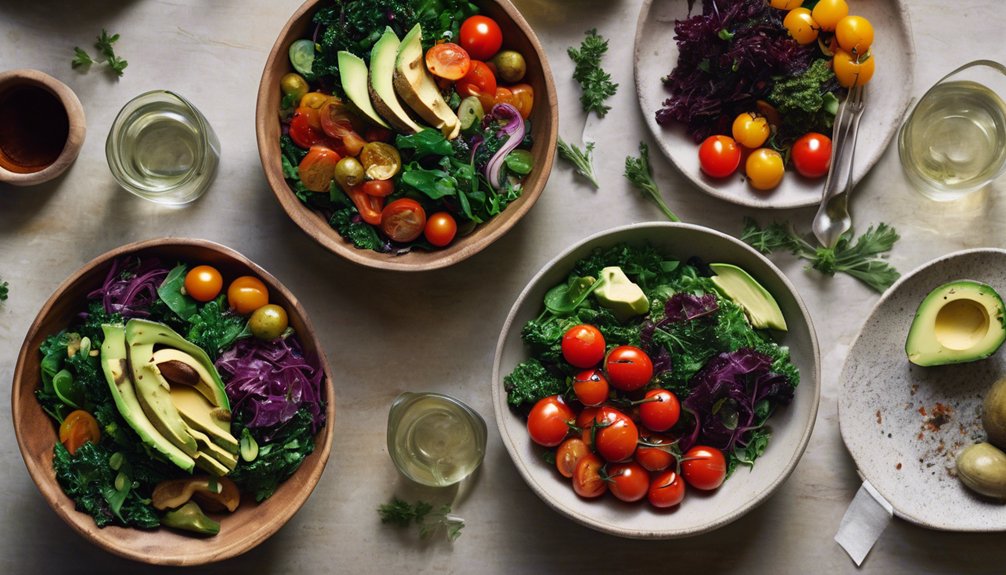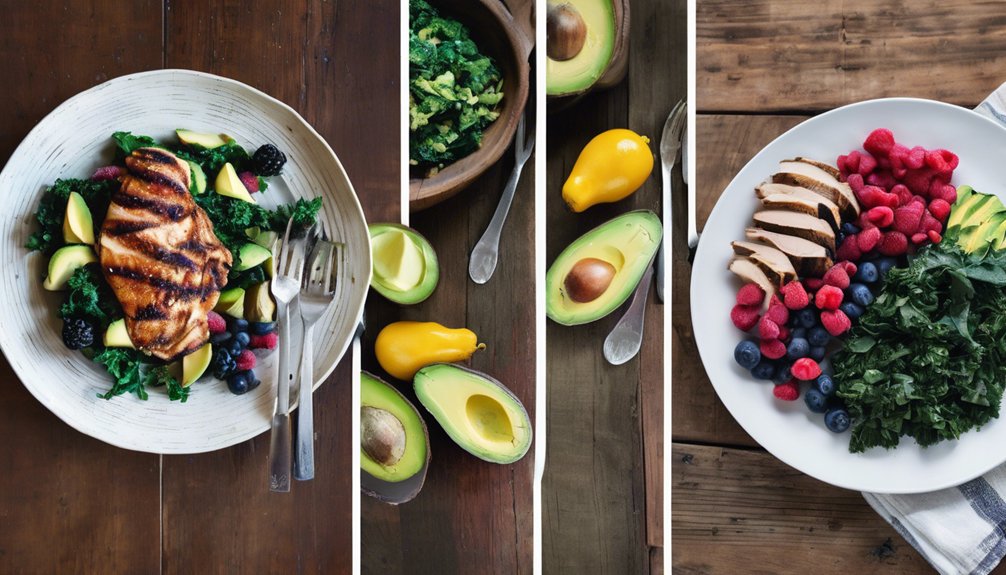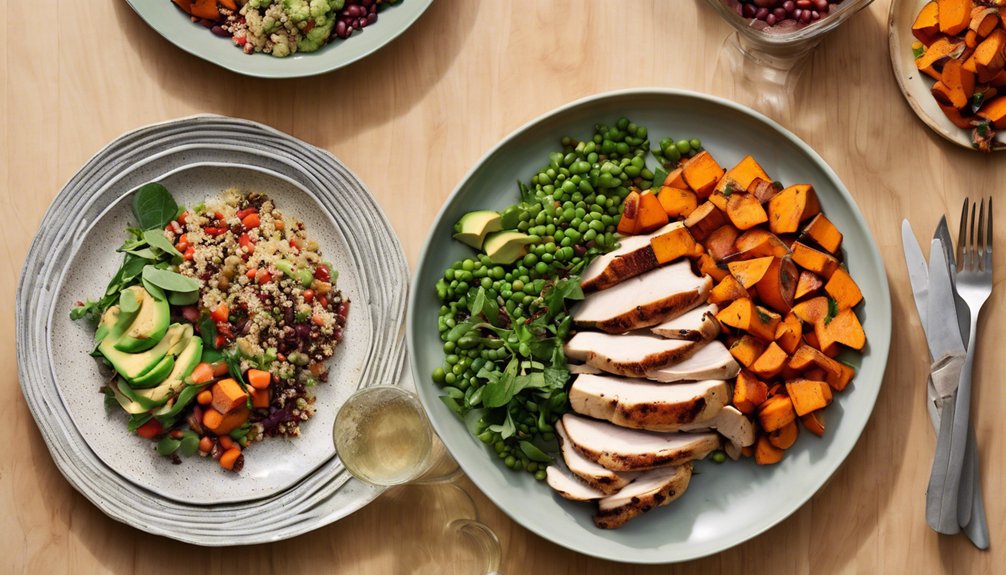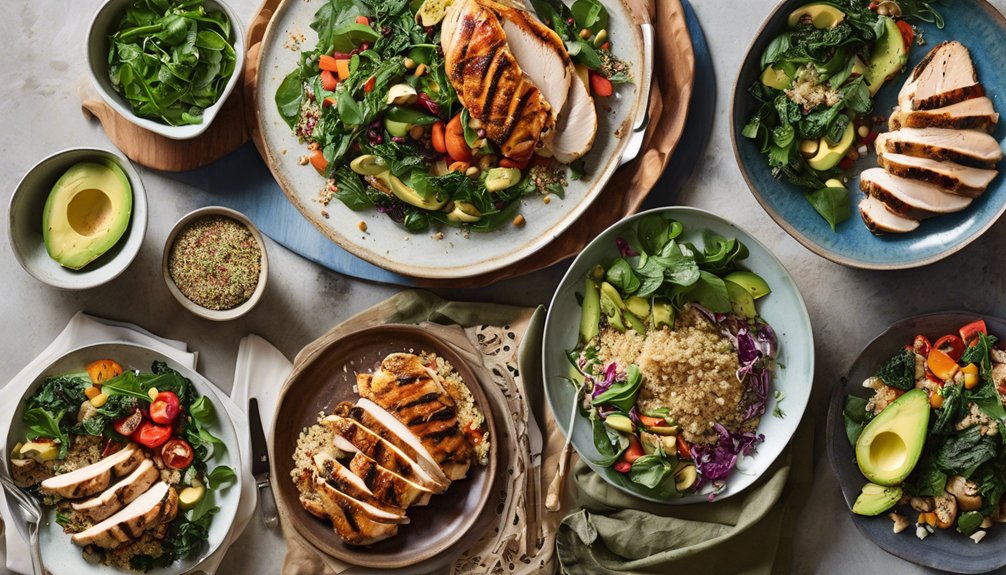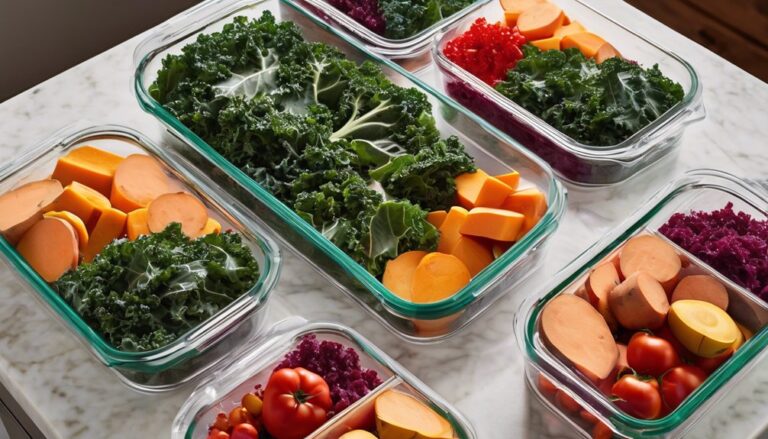Clean Eating vs. Whole30
When considering your dietary choices, you're likely to encounter clean eating and Whole30. Both approaches offer unique benefits, but they serve different purposes. Clean eating promotes long-term habits centered around whole, unprocessed foods, while Whole30 focuses on a strict 30-day reset to identify food sensitivities. Each method has its advantages, depending on your goals and lifestyle. So, how do you decide which path aligns better with your health objectives?
Key Takeaways
- Clean eating focuses on a balanced, long-term approach to consuming whole, unprocessed foods, while Whole30 is a structured 30-day elimination diet.
- Whole30 removes sugar, grains, dairy, and legumes to help identify food sensitivities, whereas clean eating allows for variety and flexibility.
- Clean eating promotes overall health through nutrient-dense choices, while Whole30 encourages a temporary reset to foster mindful eating habits.
- Both methods empower healthier decision-making, but clean eating adapts to various lifestyles, while Whole30 requires strict adherence for a short period.
- Consider personal goals: clean eating supports sustainable habits, while Whole30 offers a focused approach for those wanting immediate results.
Understanding Clean Eating
Clean eating emphasizes the consumption of whole, unprocessed foods, focusing on nourishment rather than restriction. By prioritizing nutrient density, you can fuel your body with vitamins, minerals, and antioxidants that promote overall health.
Meal planning plays a crucial role in clean eating; it helps you stay organized and intentional about what you consume. When you plan your meals, you ensure that you're selecting wholesome ingredients and avoiding processed options that may contain hidden sugars and unhealthy fats.
Embracing this lifestyle can foster a deeper connection to your food and how it impacts your wellbeing. Remember, it's not about perfection; it's about making mindful choices that nourish and sustain you on your journey to better health.
Exploring the Whole30 Program
While clean eating focuses on long-term dietary habits, the Whole30 program offers a more structured, short-term approach to resetting your eating patterns.
Over 30 days, you'll eliminate sugar, grains, dairy, and legumes, following specific Whole30 guidelines designed to help you identify food sensitivities and improve your overall health.
It's not just about restriction; it encourages you to explore new foods and flavors.
You'll find a wealth of delicious Whole30 recipes that make cooking fun and satisfying, from hearty vegetable stir-fries to creative cauliflower dishes.
Key Differences Between Clean Eating and Whole30
Understanding the key differences between clean eating and Whole30 can help you choose the right approach for your dietary goals.
Clean eating focuses on consuming whole, minimally processed foods, emphasizing balance and variety. You'll find flexibility here, allowing for a wide range of foods as long as they fit into the clean eating philosophy.
In contrast, Whole30 is a structured program that lasts 30 days, eliminating certain food groups like grains, dairy, and legumes to reset your body. This strict approach aims to identify food sensitivities, making it less flexible than clean eating.
While both promote healthier eating, the Whole30 philosophy encourages a temporary, rigorous commitment, whereas clean eating fosters a long-term, sustainable lifestyle.
Benefits of Each Approach
Both clean eating and Whole30 offer unique benefits that can enhance your health and well-being.
Clean eating emphasizes whole, unprocessed foods, which can lead to numerous health benefits like improved digestion and increased energy levels. With its focus on nutrient-rich options, you can easily adapt your meals to fit your lifestyle, providing dietary flexibility that suits your needs.
On the other hand, Whole30 is a structured program that promotes a reset of your eating habits, helping you identify food sensitivities and potentially boosting weight loss. This approach encourages mindful eating and can foster a deeper connection to your food choices.
Ultimately, both methods can empower you to make healthier decisions and feel more in control of your diet.
Choosing the Right Path for You
How do you decide which dietary approach is right for you? Start by reflecting on your personal preferences and dietary restrictions.
Clean eating allows for flexibility, focusing on whole, unprocessed foods while accommodating various lifestyles. If you enjoy a structured plan and seek to eliminate specific food groups temporarily, Whole30 might resonate more with you.
Consider your goals—are you looking for long-term habits or a short-term reset? Additionally, think about your emotional relationship with food; both approaches can foster positive changes, but your experience may differ.
Ultimately, it's about finding a path that nurtures your well-being without feeling restrictive. Trust your instincts, experiment, and listen to your body as you navigate these dietary options.
Frequently Asked Questions
Can I Drink Alcohol on the Whole30 Program?
You can't drink alcohol during the Whole30 program; it goes against the Whole30 guidelines. Instead, explore alcohol alternatives like sparkling water or herbal teas to enjoy social situations while staying on track with your goals.
Is Clean Eating Suitable for Children?
When considering children's diets, you'll find that clean eating promotes nutritional balance. It fosters healthy childhood habits, helping them develop a love for whole foods, which can set the foundation for lifelong wellness.
How Does Clean Eating Affect Weight Loss?
Clean eating promotes weight loss by prioritizing nutrient-dense foods, helping you maintain a caloric deficit. When you focus on whole foods, you nourish your body while feeling satisfied, making it easier to shed pounds sustainably.
Can I Follow Whole30 While Vegetarian or Vegan?
Imagine navigating a vibrant garden of flavors! You can certainly follow Whole30 with vegetarian adaptations or vegan alternatives. Just focus on whole, plant-based foods while ensuring you meet your protein and nutrient needs throughout the month.
Are There Any Long-Term Effects of Clean Eating?
You might notice improved nutrient absorption and digestive health over time with clean eating. However, balance is essential; too restrictive a diet can lead to deficiencies. Always listen to your body and adjust as needed.
Conclusion
In conclusion, both clean eating and Whole30 offer unique benefits to improve your health. Clean eating is like a lifelong relationship with food, focusing on balance and sustainability, while Whole30 can be a transformative boot camp for your diet. Choosing the right path depends on your personal goals and lifestyle. Whether you opt for the flexibility of clean eating or the structured reset of Whole30, both can lead to a healthier, happier you.
